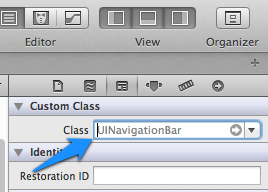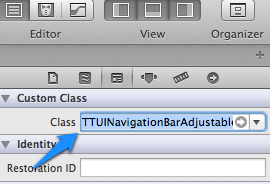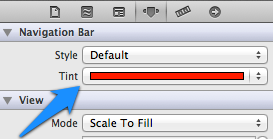You'd be crazy to use this now! This is just kept here for the posterity but wont receive updates
A subclass of UINavigationBar that allows you to control the level of tint brightness that is applied to the tintColor. Here's some example screenshots of the demo app included in the source:
- Include the files in the
Sourcedirectory somewhere in your project. - Add
#import TTUINavigationBarAdjustableTint.hin your source wherever you plan to first instantiate - or edit the properties of - your UINavigationBar or UINavigationBarController.
TTUINavigationBarAdjustableTint is just a subclass of UINavigationBar, with a property called colourAdjustFactor which you can set. The lower the number (down to 0) the darker the tint applied to the tintColour. Use TTUINavigationBarAdjustableTint where you would normally use UINavigationBar, set the tintColour, and colourAdjustFactor properties, and you're done. If that makes sense to you, you can stop reading now and get back to making your app! Otherwise, read on... :-)
- Find your UINavigationBar in interface builder (if you are also using a UINavigationBarController, you might need to use the Document Outline window to find it.
- In the Utilities window (on the right hand side), choose the Identity Inspector tab and change the "Class" property of the UINavigationBar to be TTUINavigationBarAdjustableTint instead
- Set the
TintColorproperty of your navigationBar as you normally would (either in InterfaceBuilder in the Attributes Inspector, or in code).
self.navigationController.navigationBar.tintColor = [UIColor blueColor];- When you want to change the tint brightness, either access your instance of the TTUINavigationBarAdjustableTint via the
self.navigationController.navigatonBarproperty (if your current view is inside the navigationController), or set up an outlet from Interface Builder to the TTUINavigationBarAdjustableTint, and adjust thecolourAdjustFactorproperty (see the "Options" section below for instructions on what value to set it to).
- If you normally just instaniate a UINavigationBar, simply instantiate a TTUINavigationBarAdjustableTint instead and use it in exactly the same way.
- If you are using a UINavigationController, instantiate it by calling the
initWithNavigationBarClass: toolbarClass:initialiser. For example:
UINavigationController *navigationController = [[UINavigationController alloc] initWithNavigationBarClass:[TTUINavigationBarAdjustableTint class] toolbarClass:nil];- Then use your
UINavigationControlleras you usually would. - Adjust the tint brightness by casting the
navigationBarproperty ofUINavigationControllerto aTTUINavigationBarAdjustableTintbefore changing thecolourAdjustFactorproperty. For example:
TTUINavigationBarAdjustableTint *navigationBar = (TTUINavigationBarAdjustableTint *)self.navigationController.navigationBar;
//set the tint adjustment
navigationBar.colourAdjustFactor = 1.2;- See the "Options" section below for instructions on what value to colourAdjustFactor to.
colourAdjustFactor - The brightness to adjust the top of the UINavigationBar's gradient, relative to the tintColor property.
E.g:
- If you set this to 1 the gradient will be a flat colour from top to bottom (no change). It will be the tintColour all over.
- If you set this to 0, the top of the gradient will be black, and the bottom will be the tintColor
- Anything between 0 and 1, the bottom of the gradient will be the tintColor, and the top of the gradient will be darker than the bottom, relative to how close to 0 the value is.
- Anything above 1, the bottom of the gradient will be the tintColor, and the top will be brighter than the bottom relative to how high the number is.
- Try adjusting the brightness slider on the include demo app to see the effect. On the slider, the left and side is 0 and the right hand side is 2. The middle is 1.
Here is an example of creating a simple UINavigationBarController that uses the TTUINavigationBarAdjustableTint, and sets a red tintColour with a darker tint.
First, create your UINavigationBarController. In my example, I'm going to do that in the main App Delegate, and add it as the root view controller for my app:
- (BOOL)application:(UIApplication *)application didFinishLaunchingWithOptions:(NSDictionary *)launchOptions
{
self.window = [[UIWindow alloc] initWithFrame:[[UIScreen mainScreen] bounds]];
// Override point for customization after application launch.
//THIS IS THE KEY BIT. Create a UINavigationController, with custom NavigationBar class by using the initWithNavigationBarClass (iOS 5+)
UINavigationController *navigationController = [[UINavigationController alloc] initWithNavigationBarClass:[TTUINavigationBarAdjustableTint class] toolbarClass:nil];
//From here on is just stuff you would normally do with a regualr navigation controller. Create an initial view to put inside the navigation controller.
UIViewController *firstViewController = [[MyExampleViewController alloc] init];
[navigationController setViewControllers:[NSArray arrayWithObject:firstViewController]];
//make the navigation controller the root controller of the app
self.window.rootViewController = navigationController;
[self.window makeKeyAndVisible];
return YES;
}Then, inside the viewDidLoad method of my MyExampleViewController view controller, I add the following:
- (void)viewDidLoad
{
[super viewDidLoad];
//set the tint colour of the navigation bar as usual (setting it to a deep red here)
self.navigationController.navigationBar.tintColor = [UIColor colorWithRed:150/255.0f green:22/255.0f blue:18/255.0f alpha:1.0f];
//cast the navigation bar to a TTUINavigationBarAdjustableTint and set the colourAdjustFactor property. lower = darker.
((TTUINavigationBarAdjustableTint *)self.navigationController.navigationBar).colourAdjustFactor = 0.8; //0.8 = darker
}Done!
The included source is an XCode project which you can open to see a demo.
In the Demo, the UINavigationController is first set up to use a TTUINavigationBarAdjustableTint as the navigationbar in the TTAppDelegate.m application didFinishLaunchingWithOptions method.
Then, an instance of the TintDemo ViewController is added to the Navigation Controller. Inside TintDemo.m's viewDidLoad method an initial tintColour and colourAdjustFactor value is set, by accessing the views self.navigationController property (which I can do because the view has been added to the navigationController in the TTAppDelegate).
The values of tintColor nd colourAdjustFactor are then adjusted using the sliders' Value Changed events.
You can refer to these demos for reference of how to use the library if anything is unclear :-)
Credit and thanks to coneybeare on stackoverflow at http://stackoverflow.com/questions/1852319/uinavigationbar-gradient-details for the original concept of how to draw the gradient










